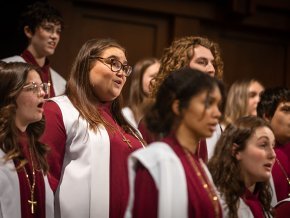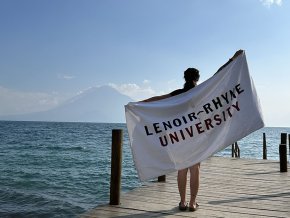Philosophy, B.A.
Sharpen your skills in critical thinking and analysis.
All learning in Western history began as philosophy. That's why a doctorate degree is still called a Ph.D. (doctorate of philosophy). Philosophy is a basic, foundational discipline, even if its vocabulary is specialized. As such, it deals with large questions like: what can we know, what should we do, what may we hope and what is human nature?
It is the mother of all academic disciplines, fundamental to intellectual and cultural literacy.
Request Information
Take the next step toward completing your Bachelor of Arts in Philosophy degree at Lenoir-Rhyne University.
Get StartedTake the next step toward completing your Bachelor of Arts in Philosophy degree at Lenoir-Rhyne University.
Philosophy sharpens our skills in critical thinking and analysis, allowing us to see through false arguments and discern underlying assumptions in arguments and theories.
Because philosophy is so versatile, the philosophy major provides a solid foundation for further study in a wide variety of fields, including not only the academic professions of philosophy, theology and religious studies, but also professions in the social sciences, psychology, law and related fields. Most important, it offers a thorough grounding in clear analytical thinking and problem solving — a skill absolutely essential in any field from corporate business to pastoral ministry.
Courses in Lenoir-Rhyne’s philosophy major seek to enrich your appreciation of the history of philosophical reflection and to guide your comprehension and critical evaluation of current issues and trends. The bachelor of arts major provides a sound foundation for further study in philosophy, the social sciences, law, theology and related fields.
Learning Outside the Classroom
The major courses in philosophy are designed as small seminar-style learning experiences. Accordingly, there is an especially rich and deep learning community between faculty and students and among students taking philosophy courses.
Opportunities to continue discussions and debates regarding the “big questions” regularly spill over and out of class onto the front porch of the Russell House, in the dining hall or in the residence halls.
Additionally, you will have opportunities to accompany faculty to local, regional or national conferences, or to participate in informal book seminars with faculty and students beyond the classroom. By its very essence, philosophy is a program that cannot be confined to the four walls of a traditional classroom.
Career Opportunities
The focus of the major and the learning skills and dispositions it generates make philosophy an especially strong liberal arts major that prepares you for a wide range of professional and/or graduate opportunities.
For example, it is a particularly popular major for students considering law school because of the critical thinking and analysis fundamental to the major. Students going to seminary find themselves much better prepared if they have a background in philosophy, since contemporary theology often builds on philosophical foundations.
Practically any profession that requires extensive critical thinking and analytical abilities benefits from philosophical study: lawyers, journalists, business people, human services and counseling professionals, writers and publishers, teachers and professors, ministers and many more.
Major Requirements
Courses in philosophy seek to enrich students' appreciation of the history of philosophical reflection and to guide their comprehension and critical evaluation of current issues and trends. The philosophy major provides a sound foundation for further study in philosophy, the social sciences, law, theology and related fields. The philosophy major earns a B.A. degree.
Honors
Students majoring in philosophy and judged qualified by the philosophy faculty may, upon invitation, elect to pursue honors work in philosophy. To graduate ''With Honors in Philosophy,'' students must have a minimum cumulative GPA of 3.0, a minimum major GPA of 3.2 and complete PHI 499.
Special Features
Students who major in two areas offered by religious studies and/or philosophy may count only six credits from courses used to fulfill the requirements of the first major to fulfill the total credit requirement of the second major. A similar limitation applies to the student who elects both a major and minor offered by youth and family ministry, religious studies and/or philosophy, except that in such instances only three credits of duplicate course credit may be applied.
-
General Education Requirements (37 hours)
Graduation Requirements (4 hours)
General Education Requirements
-
Major Requirements (30 hours)
The major consistes of 10 courses chosen as described below. Courses may only be used one time.
Philosophy Course Requirements (15 hours)Choose 5 courses of PHI
- PHI 101 - Logic
- PHI 102 - Philosophy of Human Nature
- PHI 116 - Ethics
- PHI 217 - Philosophy of Art
- PHI 298 - Ancient Philosophy and Spirituality
- PHI 299 - Modern Philosophy
Choose at least two of these 300-level courses as a part of the 5 courses
- PHI 300 - Contemporary Philosophy
- PHI 301 - Philosophy of History
- PHI 318 - Philosophy of Religion
Upper level elective (3 hours)Choose one 300-level course not used to meet requirements above.
Electives (12 hours)Choose four courses not used to meet requirements above
- PHI 101 - Logic
- PHI 102 - Philosophy of Human Nature
- PHI 116 - Ethics
- PHI 217 - Philosophy of Art
- PHI 298 - Ancient Philosophy and Spirituality
- PHI 299 - Modern Philosophy
- PHI 300 - Contemporary Philosophy
- PHI 301 - Philosophy of History
- PHI 318 - Philosophy of Religion
- HUM 188 - Humanities Level One
- HUM 388 - Humanities Level Two
- PSY 325 - Brain and Mind
- REL 120G - World Religions
- REL 220G - Theologies of Liberation
- SOC 390 - Social Theory
-
General Elective Credits
General Electives (49 hours) as needed to reach 120 hours overall.
-
Total Credit Hours - Minimum 120 hours
On occasion, technical and/or program requirements may also meet specific General Education requirements. Please confer with your program advisor to determine which courses, if any, may be counted accordingly.
All bachelor's degree programs at Lenoir-Rhyne require at least 120 credit hours. If, in combination, General Education, technical, and program requirements do not generate at least 120 hours, additional credits must be completed to achieve 120 hours. These classes may be general electives, or a student may complete a minor or additional major.
Admission & Financial Aid
-
Undergraduate AdmissionOur admission team is here to assist you in making the college search process as easy as possible. Our counselors are happy to provide the information and guidance you need to submit your application, apply for financial aid and scholarships, visit and tour our campus.
-
Financial AidWe recognize that paying for college is a top concern for students and their families. Our financial aid staff is here to provide you with financial aid options and assistance to help you achieve your educational goals.
News & Events

The tour will revive a planned itinerary from 2020, traveling from North Carolina to Virginia, Maryland, Pennsylvania and New York.
View More
Alyssa Bailey Henson ’23, DNP ’26, completed clinical hours abroad, providing essential care in the Dominican Republic and Guatemala while deepening her passion for nursing.
View More